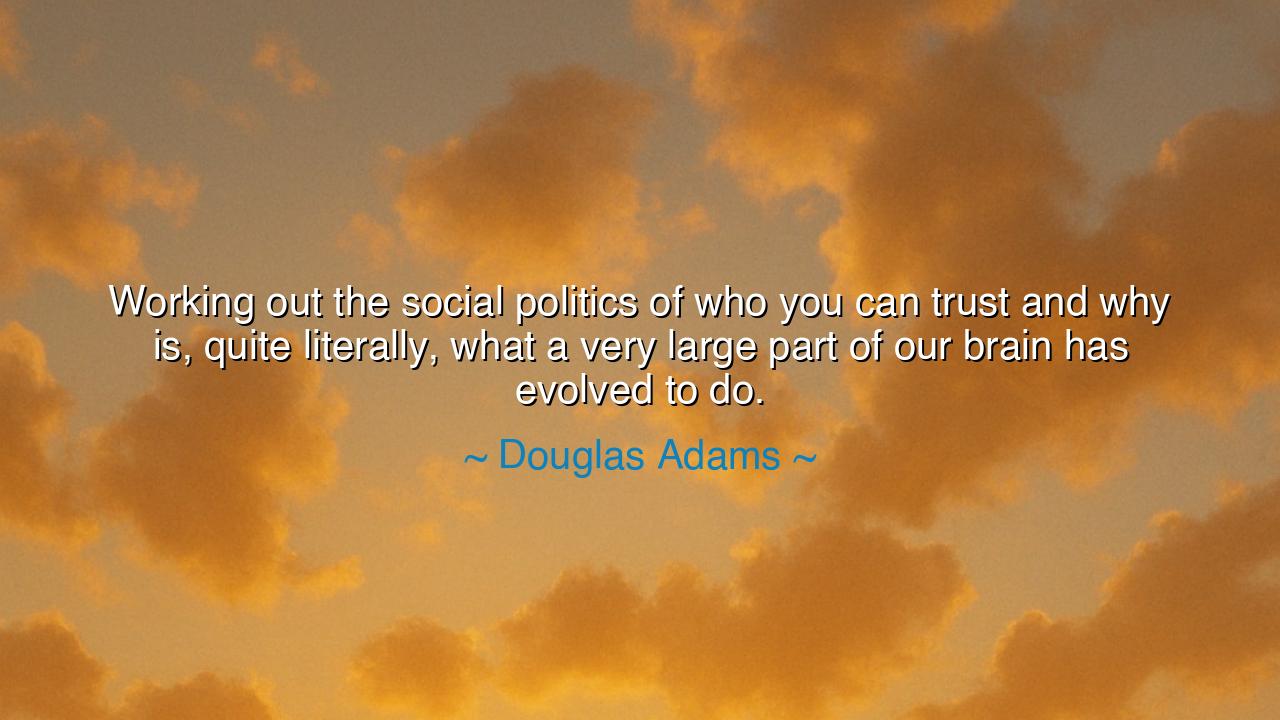
Working out the social politics of who you can trust and why is
Working out the social politics of who you can trust and why is, quite literally, what a very large part of our brain has evolved to do.






“Working out the social politics of who you can trust and why is, quite literally, what a very large part of our brain has evolved to do.” Thus spoke Douglas Adams, in his way both playful and profound, a humorist who cloaked eternal truths in wit. Behind his lightness is a deep recognition: that the matter of trust—whom we rely upon, whom we fear, whom we welcome into our circle—is not a minor concern but the very fabric of human survival. Our ancestors did not endure because they fought alone, but because they bound themselves into tribes, clans, and nations. To discern who could be trusted was as vital as fire, as shelter, as bread itself.
The ancients knew this long before the language of evolution explained it. The great philosophers of Greece spoke of friendship (philia) as the foundation of the city-state. Aristotle declared that no polis could endure without bonds of trust between its citizens, for laws themselves are powerless if men believe one another to be liars or traitors. So too, the tribes of the desert, the clans of the mountains, the fishermen of the coasts—all learned that trust was not optional. To misplace it was death; to build it wisely was life. Adams, though speaking in the modern tongue of science, confirms the ancient intuition: our very minds are shaped to judge trustworthiness, for without it, no civilization could stand.
History bears witness. Consider the fall of Julius Caesar, betrayed by those who once swore loyalty. The Roman Republic trembled not merely because of daggers in the Senate, but because the sacred fabric of trust had been torn. A society that cannot discern friend from foe becomes paralyzed by suspicion, its bonds frayed, its future uncertain. Contrast this with the endurance of the Iroquois Confederacy, who for centuries maintained peace among rival nations through systems of mutual trust, shared councils, and binding oaths. Their survival in a world of violence was not due to arms alone, but to their profound mastery of the politics of trust.
Adams’ words remind us, too, that the matter of trust is not simple. It is not blind faith but constant discernment. Every day, in families, in communities, in nations, we weigh who speaks truth and who deceives, who acts for the common good and who serves only themselves. This weighing is not weakness; it is wisdom. Our brains have evolved, as Adams says, to do this very work, to scan expressions, listen to tones, and measure deeds against words. It is an ancient radar, honed across millennia, so that humanity might not be devoured by treachery within even as it fought dangers without.
And yet, the danger of suspicion is as great as the danger of naiveté. A society that trusts no one collapses into fear, while a society that trusts too easily falls prey to tyrants and deceivers. The lesson, then, is balance: to sharpen discernment, to reward honesty, to punish deceit, and to cultivate communities where trust may grow strong. For when trust flourishes, cooperation multiplies, and through cooperation, wonders are achieved—pyramids raised, cathedrals built, voyages across oceans made possible. Humanity’s greatest works are the fruit not of solitary genius but of shared trust.
The lesson for us is clear: never take trust lightly. It is the cornerstone of your relationships, the strength of your community, the shield of your nation. Cultivate it by living truthfully yourself; guard it by discerning wisely whom you place your faith in. Do not be blind, but do not despair—seek those whose words match their deeds, and bind yourself to them. For in this lies security, not only for the present, but for the generations to come.
Practical actions follow. In your personal life, live with integrity so that others may safely trust you. In your community, reward honesty and transparency, and hold accountable those who betray trust. And in your nation, demand leaders who act not for their own gain but for the common good. Train your mind daily in discernment, as Adams suggests, for this is not a burden but a gift of evolution—a wisdom inherited from all those who came before.
Thus Douglas Adams’ words, though clothed in humor, are in truth heroic: our brains are shaped to seek trust, to weigh it, to guard it. This is no accident, but the secret of our survival and the foundation of our greatness. And so I say to you: honor trust, cultivate it, discern it—let it be the compass by which you live. For in trust lies strength, in trust lies unity, and in trust lies the future of mankind.






AAdministratorAdministrator
Welcome, honored guests. Please leave a comment, we will respond soon